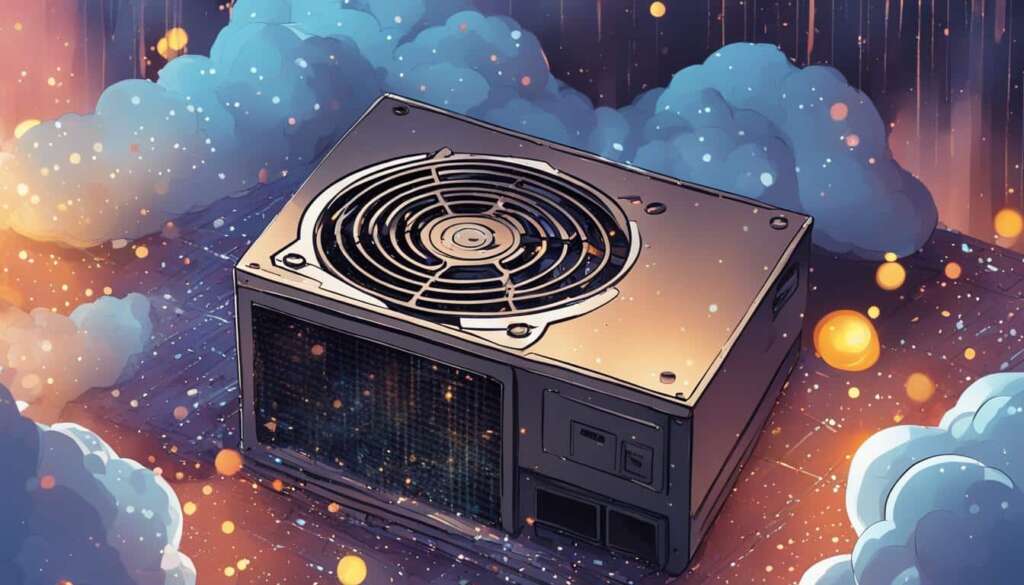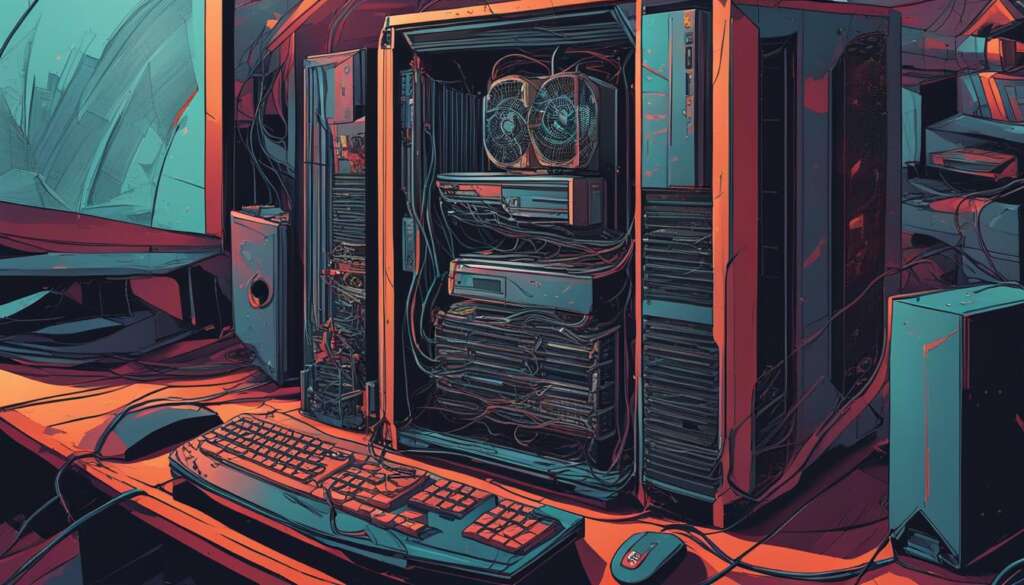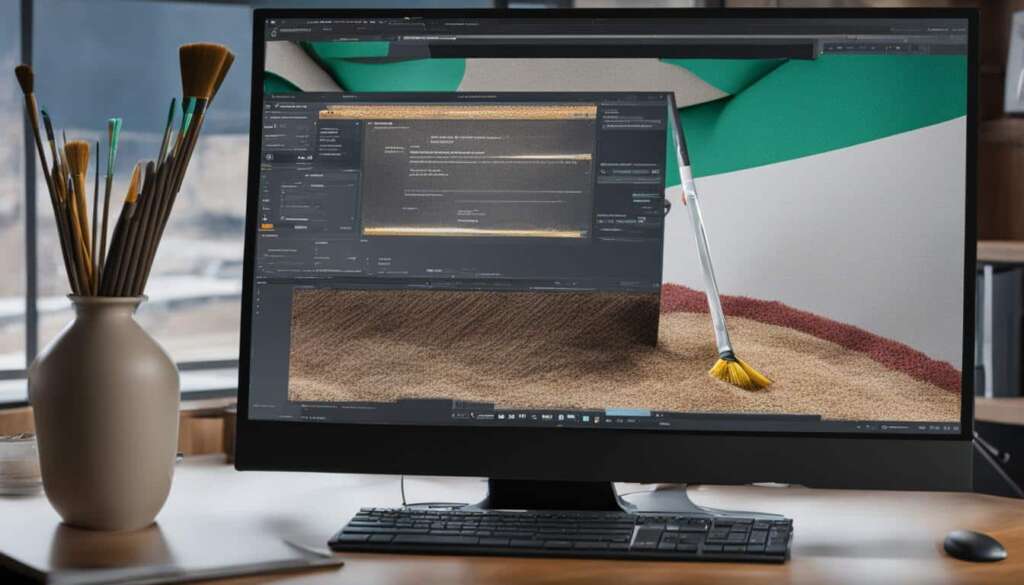Table of Contents
If you’ve ever wondered why your PC fan is making so much noise, you’re not alone. A loud PC fan can be annoying, distracting, and even a sign of underlying performance issues. In this article, we’ll explore some common reasons why your PC fan may be loud and provide troubleshooting tips to help you quiet it down.
High Internal Temperatures
One of the main reasons why your PC fan may be loud is due to high internal temperatures. This can be caused by several factors such as 100% disk usage, high RAM usage, dust and dirt in the vents, or lack of airflow. While it’s normal for the fan to get louder during intensive tasks, a consistently loud or buzzing fan may indicate larger performance issues or even a malware infection.
To make your computer quieter, you can try the following troubleshoot tips:
- Close background apps and processes to reduce CPU and RAM usage.
- Run a malware scan to ensure your computer is not infected.
- Increase airflow around your computer’s vents by keeping them clear of dust and debris.
- Clean out any dust or dirt in the ports and vents using compressed air or a soft brush.
- Turn off your computer and let it rest for a while to cool down.
- Set up fan controls in your BIOS or use software like SpeedFan to manually adjust fan speeds.
- If necessary, consider replacing a failing fan or optimizing your computer with cleanup software to reduce fan noise and improve overall performance.
Intensive Tasks and Performance Issues
During intensive tasks such as gaming, video editing, or running resource-demanding applications, it’s normal for your computer fan to get louder as it works harder to dissipate the heat generated by your CPU and GPU. However, if your fan is consistently loud or buzzing even during normal usage, it may indicate larger performance issues or component problems.
To address this, monitor your CPU and GPU temperatures using monitoring software and take necessary actions to resolve any underlying issues. This may include cleaning out dust, optimizing your computer’s resources, or seeking professional assistance if needed.
Reducing PC Fan Noise and Improving Performance
There are several steps you can take to reduce PC fan noise and improve overall performance:
- Check for and close any demanding applications that are using excessive CPU resources.
- Use the Task Manager to identify and end tasks that are hogging CPU or memory.
- Close unnecessary browser tabs to reduce resource usage.
- Consider using optimization software like Avast Cleanup to remove temporary files, bloatware, and unnecessary programs.
- Optimize your hard disk by defragmenting it regularly.
Tips to Keep Your PC Cool and Quiet
To keep your PC cool and quiet, follow these tips:
- Ensure proper airflow by keeping your computer in a well-ventilated area.
- Consider using additional cooling solutions such as fans or liquid cooling systems.
- Regularly clean out dust and debris from your computer’s vents and components.
- Avoid placing your computer on soft surfaces that can block airflow.
- Keep your operating system and drivers up to date to ensure optimal performance.
By following these troubleshoot tips and taking proactive measures to maintain your PC, you can reduce fan noise, improve performance, and extend the lifespan of your computer.
Why Does My Computer Fan Get Loud During Intensive Tasks?
Your computer fan plays a crucial role in maintaining optimal performance by dissipating the heat generated during intensive tasks. Whether you’re running multiple applications simultaneously or engaging in resource-intensive activities like multimedia editing, your computer’s fan is designed to work harder when the system is under greater stress, resulting in increased noise levels.
However, if your computer fan remains consistently loud or emits a buzzing sound even during normal usage, it may be indicative of underlying performance issues, component problems, or even a potential malware infection. Monitoring the temperatures of your CPU and GPU is essential in identifying any abnormalities in fan behavior and addressing potential concerns.
By employing effective troubleshooting measures, you can mitigate excessive fan noise and ensure your system performs optimally. It’s essential to examine various factors such as dust accumulation in vents, potential obstructions to airflow, and the overall cooling system of your computer. Implementing the necessary solutions can help minimize noise and prevent long-term damage to your system.
Remember, a consistently loud computer fan during normal usage could signify a more significant underlying issue, so it’s vital to address the problem promptly.
One of the key steps in troubleshooting excessive fan noise is to monitor and manage the heat generated by your system. Strategies such as cleaning the vents, improving airflow around your computer, and optimizing fan controls can help keep the fan noise at a tolerable level.
Steps to Reduce Computer Fan Noise:
- Regularly clean the vents and remove dust and debris accumulation to ensure optimal airflow.
- Position your computer in a well-ventilated area to facilitate better cooling.
- Consider using cooling pads or stands to enhance airflow and dissipate heat.
- Utilize software applications like SpeedFan to adjust fan speeds and optimize performance.
- Upgrade your computer’s cooling system with more efficient fans or liquid cooling solutions.
By following these steps, you can reduce computer fan noise and maintain a quieter working environment while ensuring your system remains cool and performs optimally.
How to Reduce PC Fan Noise and Improve Performance
If you’re tired of the constant whirring and buzzing sounds coming from your PC, there are steps you can take to reduce fan noise and improve overall performance. By addressing issues that may be causing your fan to work harder than necessary, you can create a quieter and more efficient computing experience.
Closing Resource-Intensive Applications
The first step in reducing PC fan noise is to check for and close any resource-intensive applications that may be placing a heavy burden on your CPU. Open the Task Manager and identify tasks that are using a significant amount of CPU or memory resources. Once you have identified these applications, close them to alleviate the strain on your system and reduce fan noise.
Limiting Browser Tabs
Multitasking online with numerous browser tabs open can lead to increased resource usage and, consequently, louder fan noise. To combat this, close any unnecessary browser tabs that are not actively being used. By reducing the number of tabs, you can minimize the strain on your CPU and keep fan noise to a minimum.
Optimizing Your System
Consider using optimization software like Avast Cleanup to remove temporary files, bloatware, and unnecessary programs that may be slowing down your system and causing your fan to work harder. These optimization tools can also optimize your hard disk, improving overall system performance and reducing fan noise.
Keep in mind that regular maintenance, such as keeping your system and software up to date, can also go a long way in reducing PC fan noise and improving performance. Additionally, ensuring proper airflow and keeping your PC’s vents clean from dust and debris can prevent your fan from working overtime.
By following these steps and implementing good maintenance practices, you can reduce PC fan noise, improve system performance, and enjoy a quieter computing experience.
Tips to Keep Your PC Cool and Quiet
Keeping your PC cool and quiet is essential for optimal performance and a pleasant computing experience. Here are some valuable tips to help you achieve that:
1. Clean the dust: Over time, dust and dirt can accumulate in your PC’s vents and fans, obstructing airflow and causing your system to overheat. Regularly clean the dust from your computer using compressed air or a soft brush. This simple maintenance task can significantly improve cooling efficiency and reduce fan noise.
2. Optimize airflow: Ensure that your PC has adequate airflow to dissipate heat effectively. Keep your computer in a well-ventilated area and avoid blocking the vents with objects or placing it on surfaces that trap heat, such as carpets. Consider using external cooling solutions such as cooling pads or fans to enhance airflow.
3. Upgrade cooling components: If you frequently engage in resource-intensive tasks such as gaming or video editing, you may benefit from upgrading your PC’s cooling components. Investing in high-quality CPU coolers, case fans, or liquid cooling systems can help maintain lower temperatures and quieter operation.
4. Manage software: Some software applications may cause your PC to work harder and generate more heat, resulting in increased fan noise. Monitor your system’s resource usage and close unnecessary programs or background processes. Additionally, consider adjusting your power settings to prioritize performance or enable power-saving modes when you don’t need maximum computing power.
By following these tips, you can ensure that your PC remains cool and quiet, enhancing its longevity and providing a more enjoyable user experience.
FAQ
Why is my PC fan so loud?
Your PC fan may be loud due to factors such as high internal temperatures caused by 100% disk usage, high RAM usage, dust and dirt in the vents, or lack of airflow. It’s important to address any underlying performance issues or malware infections that may be causing excessive fan noise.
Why does my computer fan get loud during intensive tasks?
Your computer fan is designed to get louder during intensive tasks to dissipate the heat generated by your CPU and GPU. Running resource-intensive tasks or having multiple applications open simultaneously can cause your fan to work harder and produce more noise. However, if your fan is consistently loud or buzzing even during normal usage, it may indicate larger performance issues or component problems.
How can I reduce PC fan noise and improve performance?
To reduce PC fan noise and improve performance, you can try closing background apps and processes, running a malware scan, increasing airflow around your computer’s vents, cleaning out dust in ports and vents, turning off your computer and letting it rest, and setting up fan controls in your BIOS or using software like SpeedFan. In some cases, replacing a failing fan or optimizing your computer with cleanup software may be necessary.
What are tips to keep my PC cool and quiet?
To keep your PC cool and quiet, you can ensure proper airflow by keeping vents and ports clean, using cooling pads or external fans, avoiding overclocking, using efficient cooling solutions like liquid cooling, and optimizing your computer’s performance by regularly updating drivers and software, and running cleanup tools.







